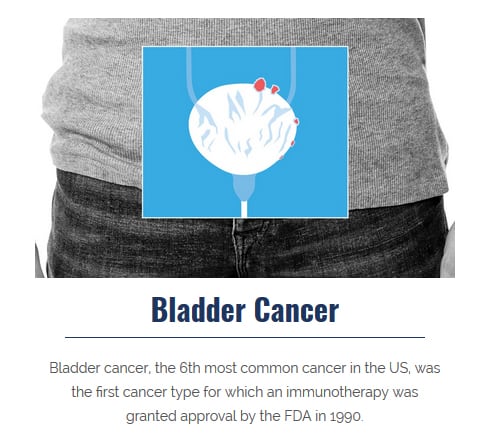Patients with advanced or metastatic bladder cancer who can’t be treated with traditional chemotherapy can now receive the immunotherapy atezolizumab (TECENTRIQ®, from Genentech) as their initial treatment.
 Historically, the chemotherapy cisplatin has been the standard treatment. Within the past year, two checkpoint inhibitor immunotherapies—atezolizumab (anti-PD-L1) and nivolumab (anti-PD-1)—have also been approved for bladder cancer patients whose tumors continue to grow after chemotherapy and/or surgery.
Historically, the chemotherapy cisplatin has been the standard treatment. Within the past year, two checkpoint inhibitor immunotherapies—atezolizumab (anti-PD-L1) and nivolumab (anti-PD-1)—have also been approved for bladder cancer patients whose tumors continue to grow after chemotherapy and/or surgery.
Unfortunately, surgery is typically ineffective against tumors that have spread to other organs, and a significant portion (Genentech estimates as many as half) of patients can’t receive cisplatin because of impaired kidney function.
Fortunately, these patients can now receive immunotherapy up front, without having to first be subjected to surgery or chemotherapy. This latest approval was based on results from the phase II IMvigor210 clinical trial, in which 119 cisplatin-ineligible bladder cancer patients received atezolizumab. In patients whose tumors expressed high levels of PD-L1 (≥5%), 28.1% of patients responded to the immunotherapy, whereas 21.8% of those with lower PD-L1 expression (<5%) responded. Both groups of patients experienced a roughly 6% complete response rate.
Atezolizumab is also approved for patients with advanced lung cancer whose tumors have progressed after previous treatments.
